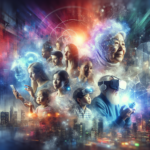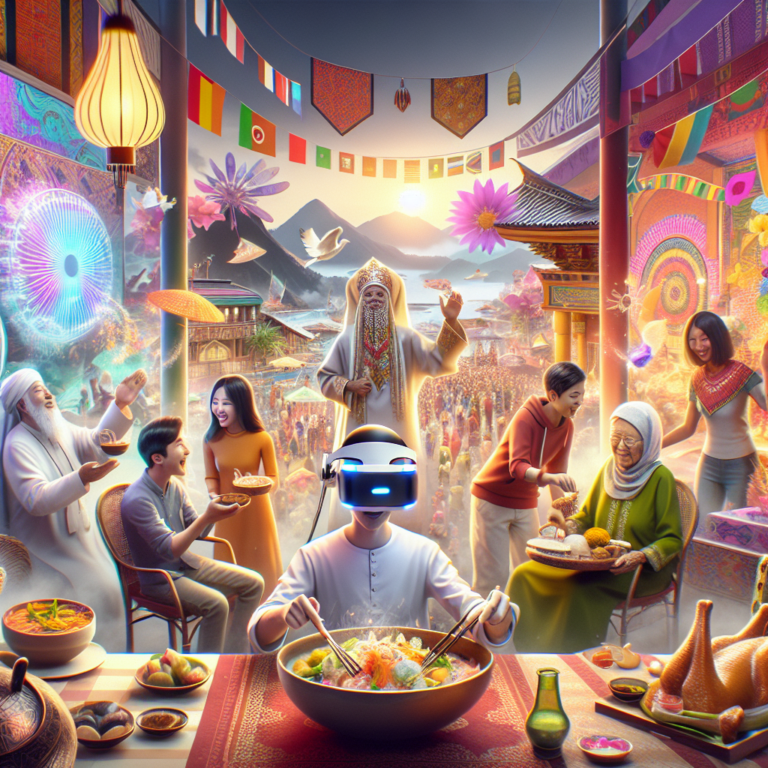Exploring Cultures Through Virtual Reality: A New Frontier for Empathy 🌍
The Shift Towards Immersive Experiences
In our fast-paced, technology-driven world, connecting with others across the globe has never been easier. However, truly understanding and empathizing with different cultures remains a challenge. What if we could harness the power of virtual reality (VR) to bridge this gap? Imagine stepping into someone else’s shoes, experiencing their lives, and understanding their daily challenges and joys—all without leaving your home. VR has the potential to foster profound empathy by immersing users in diverse cultural backgrounds, ultimately creating a more compassionate world.
How VR Creates Empathy
Empathy is the ability to understand and share the feelings of others. When applied through VR, this skill can be magnified. Here are some reasons why VR experiences are so effective in cultivating empathy:
1. Immersive Storytelling
Virtual reality offers an unparalleled level of immersion, allowing users to witness narratives from the perspective of individuals from different cultures. By removing barriers between ourselves and others, users can feel what it’s like to live in another person’s circumstances.
- First-Person Perspective: Users see and hear the world through the eyes of another, leading to deeper emotional connections.
- Interactive Narratives: Engage with characters and stories, making choices that can lead to different outcomes.
2. Experiential Learning
The most impactful learning experiences are those that involve direct participation. Through VR, users can engage in cultural rituals, culinary traditions, or day-to-day activities that reflect varied lifestyles and belief systems.
- Participate in Festivals: Experience events such as Diwali, Eid, or the Day of the Dead up close, understanding their significance and cultural context.
- Culinary Experiences: Learn to cook local dishes in a village in Italy or take part in a traditional tea ceremony in Japan.
3. Breaking Down Stereotypes
Stereotypes often stem from a lack of understanding. By immersing oneself in different cultural contexts, VR can challenge preconceived notions and reduce biases. This process promotes awareness and appreciation for diverse human experiences.
- Realistic Scenarios: Users can confront situations that dispel myths and highlight commonalities among people from different backgrounds.
- Inclusive Representation: Featuring diverse characters and stories that reflect the richness of global cultures promotes recognition of shared humanity.
Applications of VR in Promoting Cultural Empathy
As technology evolves, various sectors are beginning to explore how VR can be integrated into their practices to promote empathy and cultural understanding.
1. Education
Virtual reality can revolutionize educational experiences by allowing students to travel virtually to historical sites or engage in simulations of global events.
- Virtual Classrooms: Students can interact with peers from different cultures, fostering collaboration and diverse perspectives.
- Global History Tours: History lessons come alive when students can walk through ancient ruins or witness pivotal events in real-time.
2. Healthcare
In healthcare, understanding cultural sensitivities is crucial for providing patient-centered care. VR can facilitate training for healthcare providers.
- Cultural Competency Training: Medical professionals can engage with patients from various backgrounds, enhancing their ability to communicate and connect.
- Empathy in Action: Simulations of patient experiences can lead to a deeper understanding of challenges faced by diverse populations.
3. Social Awareness Campaigns
Organizations focused on social justice and humanitarian efforts can utilize VR to engage audiences in meaningful ways.
- Documenting Real Stories: Use VR to showcase the lived experiences of marginalized communities, amplifying their voices.
- Fundraising Initiatives: Create immersive campaigns that allow donors to see the impact of their contributions in real-time.
The Future of Empathetic Connections in VR
As VR technology continues to advance, future developments could include enhanced sensory experiences that heighten emotional engagement, such as touch and smell.
1. Expanding Cultural Reach
The potential to explore previously inaccessible cultures is vast. As more content creators develop VR experiences that celebrate global diversity, the prospect of understanding different lifestyles and traditions will become more widespread.
2. Bridging Generational Gaps
Imagine how VR could facilitate conversations between generations by allowing older individuals to share their life experiences with younger ones in immersive ways.
- Sharing Family Histories: VR can bring family stories to life, fostering connections between young people and their heritage.
- Interactive Storytelling: Older generations can narrate their experiences as users navigate through their past, creating shared moments of understanding.
3. Strengthening Global Communities
Ultimately, the objective of using VR to foster empathy is to create a global community built on understanding and respect for differences. By sharing experiences, we can break down barriers and cultivate a shared commitment to social justice and equality.
Embracing the VR Empathy Revolution
As we embrace the possibilities of virtual reality, it is essential to champion innovations that prioritize empathy in our increasingly interconnected world. Users can not only enjoy high-tech entertainment but also play an active role in crafting a brighter, more compassionate global narrative. Let’s journey into different cultures together, challenge our perceptions, and build bridges of understanding through the transformative power of virtual reality! 🌈




0 Comments